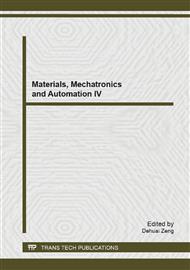[1]
Cohen, Leon. Time-frequency distributions-a review., Proceedings of the IEEE 77. 7 (1989): 941-981.
Google Scholar
[2]
Mallat, Stephane G., and Zhifeng Zhang. Matching pursuits with time-frequency dictionaries., Signal Processing, IEEE Transactions on 41. 12 (1993): 3397-3415.
DOI: 10.1109/78.258082
Google Scholar
[3]
Mallat, Stephane G., and M. Avellaneda. Greedy adaptive approximation.,J. Constr. Approx 13 (1997): 57-98.
DOI: 10.1007/bf02678430
Google Scholar
[4]
da Silva, Adelino R. Ferreira. Atomic decomposition with evolutionary pursuit., Digital signal processing 13. 2 (2003): 317-337.
DOI: 10.1016/s1051-2004(02)00028-3
Google Scholar
[5]
Q. Gao, A study of genetic algorithms and its applications in fault diagnosis. Dissertation, Xi'an Jiaotong University, PRC, (2005).
Google Scholar
[6]
McClure, Mark R., and Lawrence Carin. Matching pursuits with a wave-based dictionary., Signal Processing, IEEE Transactions on 45. 12 (1997): 2912-2927.
DOI: 10.1109/78.650250
Google Scholar
[7]
Narayanan, Ajit, and Mark Moore. Quantum-inspired genetic algorithms., Evolutionary Computation, 1996., Proceedings of IEEE International Conference on. IEEE, (1996).
DOI: 10.1109/icec.1996.542334
Google Scholar
[8]
Han, Kuk-Hyun, and Jong-Hwan Kim. Genetic quantum algorithm and its application to combinatorial optimization problem., Evolutionary Computation, 2000. Proceedings of the 2000 Congress on. Vol. 2. IEEE, (2000).
DOI: 10.1109/cec.2000.870809
Google Scholar
[9]
Lobo, Arthur P., and Philipos C. Loizou. Voiced/unvoiced speech discrimination in noise using gabor atomic decomposition. " Acoustics, Speech, and Signal Processing, 2003. Proceedings. (ICASSP, 03). 2003 IEEE International Conference on. Vol. 1. IEEE, (2003).
DOI: 10.1109/icassp.2003.1198907
Google Scholar
[10]
Qian, Shie, and Dapang Chen. Signal representation using adaptive normalized Gaussian functions., Signal processing 36. 1 (1994): 1-11.
DOI: 10.1016/0165-1684(94)90174-0
Google Scholar
[11]
Herley, Cormac, et al. Tilings of the time-frequency plane: Construction of arbitrary orthogonal bases and fast tiling algorithms., Signal Processing, IEEE Transactions on 41. 12 (1993): 3341-3359.
DOI: 10.1109/78.258078
Google Scholar
[12]
Nielsen, Michael A., and Isaac L. Chuang. Quantum computation and quantum information. Cambridge university press, (2010).
Google Scholar
[13]
Shor, Peter W. Algorithms for quantum computation: discrete logarithms and factoring., Foundations of Computer Science, 1994 Proceedings, 35th Annual Symposium on. IEEE, (1994).
DOI: 10.1109/sfcs.1994.365700
Google Scholar
[14]
Yang, Junan, Bin Li, and Zhenquan Zhuang. Research of Quantum Genetic Algorith and its application in blind source separation., Journal of Electronics (China) 20. 1 (2003): 62-68.
DOI: 10.1007/s11767-003-0089-4
Google Scholar
[15]
Zhang, Ge-xiang, et al. Novel quantum genetic algorithm and its applications., Frontiers of Electrical and Electronic Engineering in China 1. 1 (2006): 31-36.
Google Scholar


